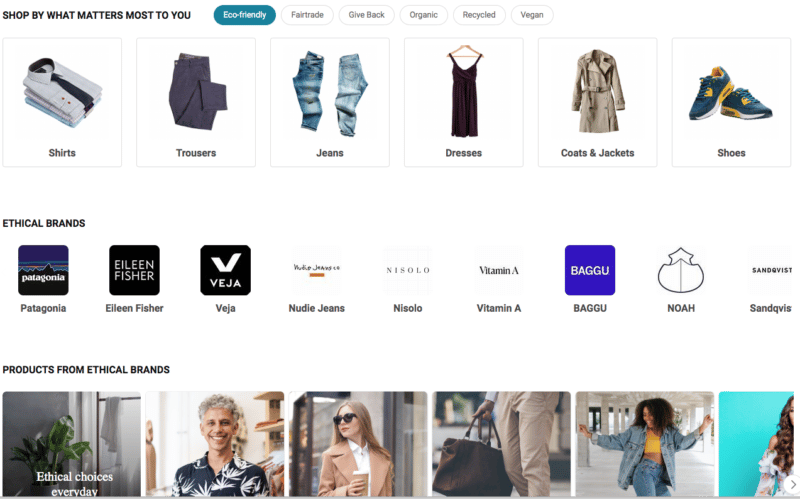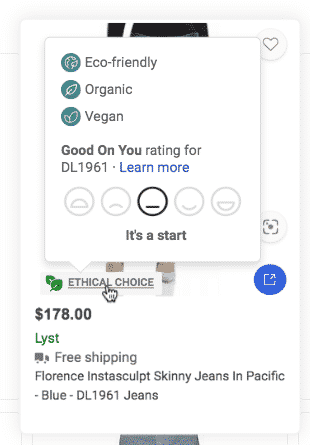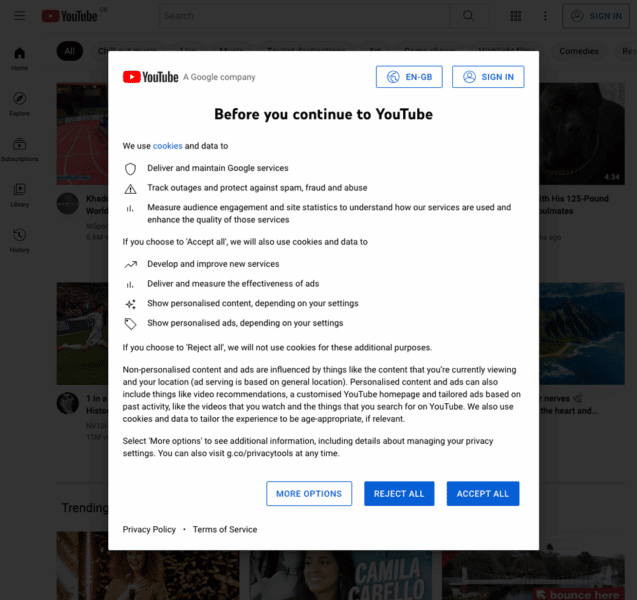
Bing’s Ethical Shopping hub expands to the U.S., Canada
Microsoft Bing’s Ethical Shopping hub is now available in the U.S. and Canada. It launched in December, but only in the UK.
In addition, the hub has a new design, and the experience can be triggered when people search for relevant queries in English.

What is the Ethical Shopping hub? It allows people to search for fashion products in categories such as eco-friendly, fairtrade, recycled, vegan, and more. Every brand included in the experience receives a rating (powered by Good on You) based on three sustainability areas: people, planet, and animals.
New design. Microsoft Bing is giving searchers more visibility into sustainability. Now, when you hover over the Ethical Choice label on a product listing you will see the overall brand rating (e.g., It’s a Start, Good, Great) and which criteria it is rated well on (e.g., Eco-Friendly, Organic, Vegan). Here’s an example screenshot from the hub

So, if it’s important for a shopper that a brand is rated as Eco-Friendly, this notation could help lead to a sale.
Integrated into Microsoft Bing search. It’s more than a hub now. Microsoft said in their blog post they have also expanded the experience so that it will show up when searching relevant queries on Bing. This should lead more searchers to discover the Ethical Shopping hub.
Source: Bing’s Ethical Shopping hub expands to U.S., Canada
4 technical SEO tasks that are critical to organic success
“Driving revenue and awareness from search relies on your website health — today’s success in organic search is about a lot more than just keywords and content,” said Shachar Radin Shomrat, CMO of Deepcrawl, in her presentation at The MarTech Conference. “It demands technically sound websites in today’s marketing landscape.”
“Over a longer timeframe, the technical aspects of your website play a huge role in how well your content performs,” she added.
If SEOs don’t take the time to optimize critical technical aspects of your site that influence page speed, indexing, and more, it could mean lost traffic and revenue.
Here are four key technical tasks SEOs should take care of to help increase organic visibility.
1. Optimize site architecture
“Architecture is your foundational stage,” Shomrat said. “If the overall website structure is not optimized for search performance, then any individual page on that site is not set up to have its best chance at being crawled, appearing with search results and ultimately converting into a revenue-driving asset.”
No two sites are the same, but most search professionals agree site architectures should generally have a logical flow with a hierarchy of pages. This helps users and crawlers make sense of your site.
2. Ensure pages are crawlable
Your pages should be accessible to search engines and users via valid status codes. SEOs should make sure the pages they want to be included in the index have a 200 HTTP status code.
3. Check which pages allow indexing
Just because your pages are crawlable doesn’t mean they’re indexable. Marketers need to make sure their pages’ robots tags allow for indexing.
“If a page is not indexed by search engines, then it will not appear to users in their search results at all,” Shomrat said.
4. Improve page experience
People are less likely to convert to sites that offer poor experiences, such as slow-loading pages. Google and other search engines encourage site owners to optimize their technical structures to prevent this from happening, allowing their content to shine in the search results.
“If you do not fix your [technical] foundation, your content and keyword investments are not going to get the return that you expect,” Shomrat said.
Source: 4 technical SEO tasks that are critical to organic success
Google unveils a simpler way for European users to reject cookies
Google is making it easier to reject all cookies on search and YouTube in Europe. These changes will begin in France before expanding to the European Economic Area, the UK, and Switzerland.
Visitors who are signed out or in Incognito Mode will be presented with a choice to either reject or accept all cookies via buttons. A third option offers more options, and allows users to customize their choices.
What it looks like. Here’s a screenshot Google provided of the new look on YouTube.

Why now? French data privacy watchdog CNIL fined Google.fr 150 million euros Jan 6. Google was given three months to provide a simple way for users to refuse cookies. Had Google not hit that deadline, the company would have had to pay 100,000 euros per day.
Source: Google unveils a simpler way for European users to reject cookies
Setting client expectations with a thorough preliminary SEO analysis

There are at least three huge mutual benefits to performing a comprehensive data-driven SEO analysis of a new client’s website.
First, your digital agency shows off its personalized, professional approach to every client by demonstrating that you avoid standardized templates. This gives the client the understanding that you set goals, terms of cooperation, and pricing policies on an individual basis.
Second, this helps develop trust in your relationship with the client as they get a clear picture of what’s to be expected, how you plan on achieving their goals and why they are charged the rate you set.
Lastly, a detailed analysis gives you the opportunity to lay out a clear roadmap, set the right expectations, and shed light on the workflow for the now-educated client. Everyone will be on the same page when it comes to understanding what’s working for them and what areas need to be improved upon. To recap, a diligently performed preliminary SEO analysis and audit allow you to identify realistic long-term goals and short-term deliverables, but that’s a topic for another time. The key to building a healthy client-agency relationship is diving head-first into their project to understand it practically as the client does.
Source: Setting client expectations with a thorough preliminary SEO analysis
More news:
TikTok’s In-Feed Ads get more visual with Interactive Add-Ons